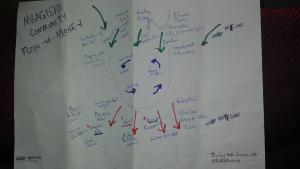A big gourd with a hole in the bottom cannot be filled – Maasai Proverb
After an intensive 3 weeks of finding out the huge store of people’s capacities and drafting out the importance of the institutions in Mbagishi Community, a settlement in Tsar, Vandeikya Local Government of Benue State, it was clear that there were numerous gifts that lie dormant among the people.
 Beyond the gifts, there is a flow of money in and out of this community, just like every other community in the world. But, there was little or no practical understanding among the participants how the money flowed and how they can manage their financial resources for higher productivity.
Beyond the gifts, there is a flow of money in and out of this community, just like every other community in the world. But, there was little or no practical understanding among the participants how the money flowed and how they can manage their financial resources for higher productivity.
To set the session in motion, Prikkle Academy had studied the ‘leaky bucket’ experiment of understanding personal and community money from Asset-based Community Development resources shared by the Nurture Development and Coady International institute.
“The leaky bucket is a popular education tool that helps people at the grassroots better understand their local economy. It enables them to identify and quantify the main flows of money coming into and out of their community. In turn, this process often leads to revealing economic opportunities, which may help community members improve their household and community well-being.” – Gord Cunningham.
We are aware that to make this knowledge relevant and practical for our participants, our creative juice must flow.
The materials we used were;
- Water in a bottle
- 2 nylon bags
- 1 plastic mesh
The method was as follows;
First Nylon: represents someone’s money bag. We made a small hole at the base of this nylon.
Second Nylon: represent another person’s money bag. No hole was made on this nylon
Plastic mesh: represent the third person’s money bag.
Water: represent money.
We poured equal amount of water into the 3 media (the leaking nylon, the imperforated nylon and the mesh. Then we asked the participants, “Which of these 3 persons has most money?”
There was a heated discussion and very inspiring contributions from the participants. It made it very easy to understand the perception of the participants about money, how they spend it, how they invest it and in fact, how they acquire it.
The conversation led to more questions such as;
- ‘What do spend most of your money on every month?’ Most participants said, they spend most of their money on buying soap.
- Can you account for your expenditure and income in the last 1 month? None of the participants was able.
At the end of the session, the participants decided to start tracking their expenditure, income and investment. They also concluded that it is necessary for them to start thinking of diversifying their economy, since most of them depend solely on farming.
